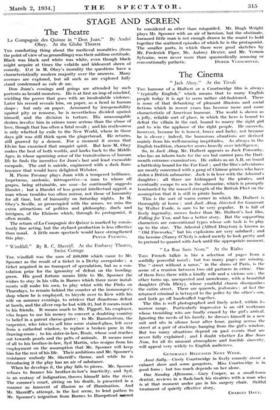STAGE AND SCREEN The Theatre La Compagnie des Quinze in
" Don Juan." By Andr6 Obey. At the Globe Theatre THE comforting thing about the medieval moralities (from the point of view of us groundlings) was their sublime certitude. Black was black and white was white, even though black might acquire at times the volatile and iridescent sheen of comedy. aft in M. Obey's morality the questions have a characteristically modern majority over the answers. Many avenues are explored, but all such as are explored fully stand condemned as cuts de sac.
Don Juan's comings and goings are attended by such portents as herald monsters. He is at first an imp of mischief, wielding the power that goes with an incalculable violence. Later his record reveals him, on paper, as a fiend in human shape ; but only on paper. Armoured by irresponsibility against pity or remorse, he is nevertheless divided against himself, and the division is torture. His unassuagable desires involve him in crimes more serious than the abuse of love, though that has often a fatal result ; and his restlessness is only whetted by exile to the New World, where in those days gilt was still thick upon the gingerbread. He returns, still gnawed by a demon. For a moment it seems that Elvire has exorcized that unquiet spirit. But here M. Obey makes the best of both worlds, and harks back to the Middle Ages, in whose agonizing sense of the transitoriness of human life he finds the incentive for Juan's last and least excusable escapade. The end is suicide, engineered with a dark flam- boyance that would have delighted Webster.
M. Pierre Fresnay plays Juan with a tempered brilliance. Impetuous, sardonic, introspective—a man to whom all grapes, being attainable, are sour—he continually suggests Hamlet ; but a Hamlet of less general intellectual appeal, a man whose troubles too often mirror, not those of humanity for all time, but of humanity on Saturday nights. In M. Obey's Seville, so preoccupied with the senses, we miss the extra attractions of politics and philosophy, duels and intrigues, of the Elsinore which, through its protagonist, it often recalls.
The return of La Compagnie des Quinze is marked by consis- tently fine acting, but the stylized production is less effective than usual. A little more spectacle would have strengthened




























































 Previous page
Previous page